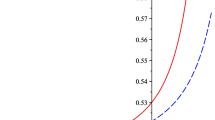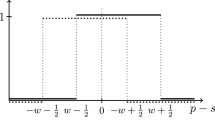Abstract.
In this paper we examine the strategic implications of collective acquisition of information in a committee or in a legislature. We show that the prospect of acquiring information can harm a majority even if information is only available by the support of a majority. Moreover, the model provides two results about incentives to acquire information. First, for policies with high distributional uncertainties, we expect that less information is acquired collectively by a committee than for other policies. Second, for policies that show only size uncertainty, our model predicts intense efforts to acquire information collectively.
Similar content being viewed by others
Author information
Authors and Affiliations
Additional information
Received: 20 January 1997/Accepted: 15 February 1999
Rights and permissions
About this article
Cite this article
Gersbach, H. Size and distributional uncertainty, public information and the information paradox. Soc Choice Welfare 17, 241–246 (2000). https://doi.org/10.1007/s003550050018
Issue Date:
DOI: https://doi.org/10.1007/s003550050018




